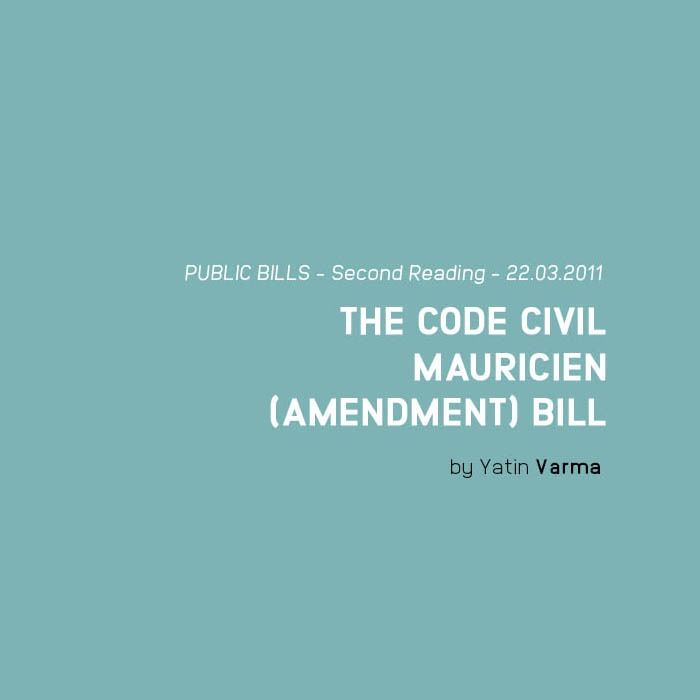Order for Second Reading read
The Attorney General (Mr Y. Varma): Mr Speaker, Sir, I move that the Code Civil Mauricien (Amendment) Bill (No. XV of 2010) be read a second time.
Mr Speaker, Sir, according to Article 122 of the Code Civil Mauricien, there are two scenarios where a person can be declared absent. The first scenario is where a period of five years has elapsed since a person has been presumed absent, following his présomption d’absence declared by the Judge in Chambers. Such a decision may follow an application made by either an interested party or the Ministère public to the Judge in Chambers to declare the person absent. The second scenario is the situation where there has been no présomption d’absence, but the person has ceased to appear at his place of domicile or residence for a period of at least ten years. Here as well, any interested party or the Ministère public may apply to the Judge in Chambers to have the person declared absent.
Article 122 of the Code Civil Mauricien applies to all cases of absence. Absence has been defined as “… l’état d’une personne physique qui a cessé de paraître à son domicile ou à sa résidence et dont on n’a point eu de nouvelles, de sorte que son existence est incertaine et qu’on doit présumer d’abord sa survie et ensuite son décès…”. (Encyclopédie Dalloz Civil, Vol I, Vo. Absence).
Mr Speaker, Sir, it is believed that the time delay applicable to both scenarios mentioned earlier, namely five years and ten years, is unduly long. Recent events, in particular the disappearance of fishermen following the capsize of King Fish II and V, and the resulting distress that their families experienced at the time because of the impossibility of having a déclaration d’absence pronounced, illustrate how families have suffered unnecessarily due to the long waiting periods.
Mr Speaker, Sir, Government has, therefore, decided to introduce the Code Civil Mauricien (Amendment) Bill, in order to reduce the time limits applicable to declare a person absent.
The Bill accordingly provides that, in the first scenario, namely where there is already a déclaration d’absence with regard to a person, the time limit before that person may be declared dead will be reduced from five years to three years. This will allow any interested person or the Ministère public to make an application for présomption d’absence to the Judge in Chambers, once a period of three years has lapsed from the time that person was presumed absent.
As regards the second scenario, namely where there is no présomption d’absence with regard to a person, but that person has ceased to appear at his place of domicile or residence, this Bill provides that, instead of waiting for at least ten years before applying for a déclaration d’absence, an interested person or the Ministère public may make the application after a period of five years only.
Mr Speaker, Sir, some of the main advantages that will result from the proposed amendment are as follows –
(a) the psychological and emotional distress faced by the families will be reduced, as they will be able to come to terms with the death of that person sooner. This will allow families to faire le deuil plus tôt;
(b) the delay for the processing of pension payments to orphans and widows entitled to pensions under the National Pensions Act will be shortened, and
(c) the earlier opening of the succession, which may to some extent reduce the financial hardship of the spouse or heirs, as they may be encountering financial hardships following the absence of the main or sole breadwinner of the family.
Mr Speaker, Sir, it is believed that the proposed time limit in both scenarios, namely three years and five years, are sufficiently long to allow insurance companies and other relevant authorities to verify the déclaration d’absence. Indeed, it has been noted that an overwhelming majority of applications for déclaration d’absence result from natural catastrophes or accidents at sea, where the possibility of survival after three years or five years can safely be ruled out.
Mr Speaker, Sir, with these words, I commend the Bill to the House.
The Deputy Prime Minister rose and seconded.
Mr Varma: Let me thank the hon. Leader of the Opposition for supporting the Bill, Mr Speaker, Sir. This, in fact, reflects the maturity of our democracy. It shows that, in certain cases, especially of general public interest, our legislators, from whichever side of the House they are, can rise above party politics. This Bill, Mr Speaker, Sir, is the first to be debated, and I hope the same spirit prevails throughout the year.
Question put and agreed to.
Bill read a second time and committed.


Leave a Reply